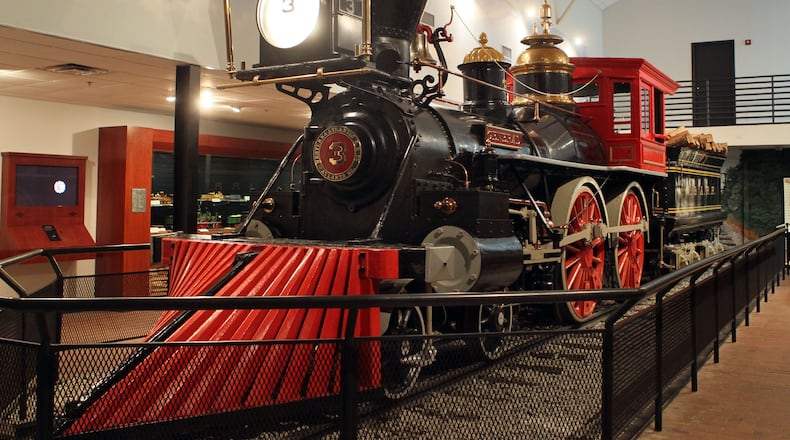Q: What’s the story behind The General locomotive in Kennesaw?
A: The General is best known for its role in the Great Locomotive Chase of the Civil War, also known as Andrews' Raid. The steam locomotive was assembled in Paterson, N.J., in 1855 and sailed down the coast, where it was commissioned to transport passengers and freight between Atlanta and Chattanooga, Tenn.
During the Civil War, with the exception of hauling more military goods than before, The General’s purpose did not change.
“In fact, that’s how Andrews and the raiders were able to board it that day,” said Dustin Klein, archivist and registrar at the Southern Museum of Civil War and Locomotive History in Kennesaw, where The General is housed. “It was actually pulling several passenger cars for people traveling between Atlanta and Chattanooga and the various towns in between.”
On April 12, 1862, James Andrews, a Union spy posing as a Confederate smuggler, boarded The General in Marietta, along with 20 others in a Union raid to disrupt Confederate supply lines.
Both of the locomotives are housed in metro Atlanta museums
The General is located at the Southern Museum of Civil War and Locomotive History in Kennesaw. The General is on exhibit at the Atlanta History Center in Buckhead.
Knowing that rail lines were an important means of transporting supplies and troops, Andrews had hatched a plan to steal The General and destroy rails and bridges along the way to Chattanooga, said Klein. The destruction of railroads to Chattanooga, a major rail hub, would deal a major blow to the Confederates and allow Union forces to capture the city.
The operation didn’t go according to plan.
“As they made their way (to Marietta), a couple of them actually ended up stumbling into a Confederate encampment and got basically impressed into Confederate service,” said Klein. “Of the 22 men who actually make it to Marietta, two oversleep the day of the raid; so now you’re down to 20, and they’ve just started on their journey.”
While Andrews and his raiders boarded and stole The General from its conductor, William Fuller, various snags, including several days of rain, had delayed their arrival by a day. The raid was meant to take place simultaneously with a Union attack on Huntsville, Ala. The attack occurred, and the Confederates then guessed that Chattanooga was next. They responded by sending more trains than normal out of Chattanooga the next day, clogging the railway south toward Atlanta.
On April 12, said Klein, the raiders now in control of The General faced traffic and more delays. Fuller caught up with The General. The combination of Fuller’s pursuit and the water-logged railroad bridges meant that the raiders didn’t have time to pry up tracks, burn bridges or refuel.
The 87-mile chase ended when The General ran out of fuel and was abandoned north of Ringgold, just 18 miles short of Chattanooga. Andrews and his raiders were captured.
“James Andrews, along with several other raiders were hanged as spies, but the remainder either escaped on their own or were exchanged in a prisoner exchange,” said Klein. “The men who were involved in the chase — the Union raiders, the soldiers — they were actually among the first recipients ever of the Medal of Honor, which was a newly made award during the Civil War.”
The General was retired in 1890 and displayed in Vinings, said Klein. It was later purchased, restored and exhibited at the Chicago World’s Fair in 1893. The locomotive was then displayed in Chattanooga. In the late 1960s, the state of Georgia won ownership after a court battle with the city of Chattanooga. In 1972, The General was moved to Kennesaw.
About the Author
Keep Reading
The Latest
Featured


